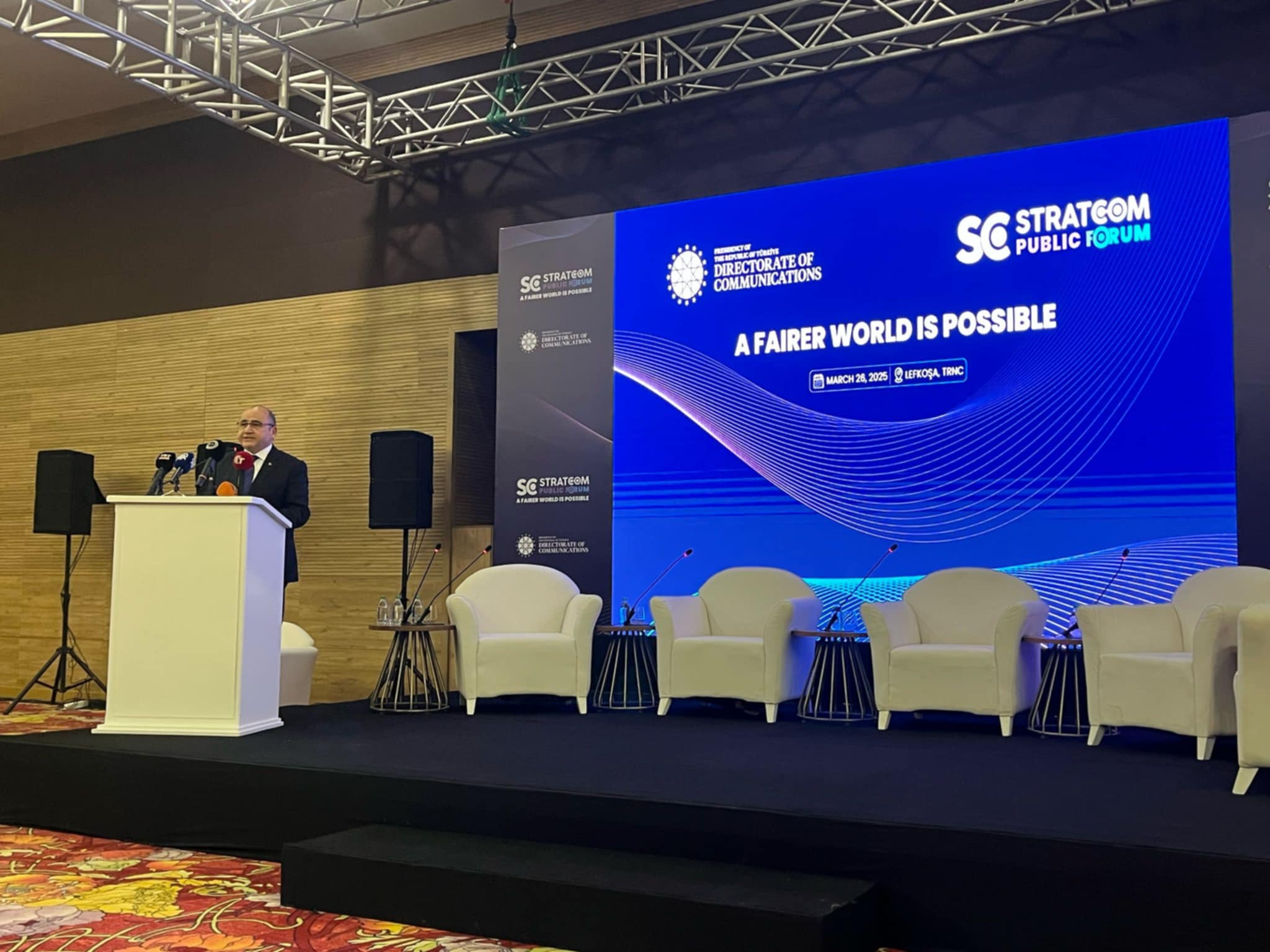
The Presidency of the Republic of Türkiye’s Directorate of Communications held the Stratcom Public Forum “A Fairer World is Possible” panel in the Turkish Republic of Northern Cyprus (TRNC) on Wednesday.
The panel was realized at the Concorde Hotel in Lefkoşa, its opening session was aired live on BRT.
Speaking at the opening of the session, Türkiye’s Ambassador to Lefkoşa, Ali Murat Başçeri, emphasized the importance of addressing global governance issues that concern the entire world.
Highlighting the systemic flaws within the UN, Başçeri pointed to Ukraine and Gaza as the most recent and dramatic examples of its shortcomings. He also stressed that the Muslim population, which makes up a quarter of the world, is not adequately represented in global decision-making.
Quoting Turkish President Recep Tayyip Erdoğan, he reminded that “The world is bigger than five,” underscoring the need for a more inclusive international system.
Turning to the Cyprus issue, Başçeri criticized the UN Peacekeeping Force (UNFICYP) for extending its mandate without the consent of the Turkish Republic of Northern Cyprus (TRNC).
He argued that the mission has failed to maintain impartiality, allowing multiple violations by the Greek Cypriot side while obstructing the construction of the humanitarian Pile road project. He reiterated that it is the Turkish Armed Forces that have ensured peace on the island.
Başçeri reaffirmed Türkiye’s commitment to the TRNC, stating that the ongoing international isolation of the Turkish Cypriots is unjust, especially after the Greek Cypriot side was unfairly rewarded following the rejection of the Annan Plan.
He emphasized that the only viable solution is a two-state model and called on the international community to heed President Erdoğan’s appeal at the UN General Assembly.
Speaking next, Foreign Minister Tahsin Ertuğruloğlu criticized the United Nations (UN), stating that it does not solve problems but rather perpetuates them. Recalling a conversation with British diplomat David Hannay on justice, he highlighted the contradiction of the UK—a country with a historical lack of fairness—being one of the five permanent veto-holding members of the UN Security Council.
Addressing the Geneva Cyprus talks, Ertuğruloğlu noted that the UN Secretary-General, while personally sincere, remains bound by Security Council decisions.
He criticized the process for avoiding new approaches and merely recycling failed discussions. The report presented by the UN’s personal envoy, María Ángela Holguín, confirmed the absence of common ground between the two sides, yet the phrase “no common ground” was omitted due to UK influence, leading to another round of talks.
Ertuğruloğlu dismissed the idea that meaningful negotiations were underway, arguing that Greek Cypriot leadership refuses to discuss sovereignty with the TRNC.
He criticized efforts to frame new talks as a significant diplomatic process, stating that such meetings could have been held in Lefkoşa rather than Geneva.
He concluded that the UN Security Council is deliberately stalling the TRNC, and unless the root cause of the Cyprus problem—the Greek Cypriot side’s illegitimate claim to the Republic of Cyprus—is addressed, no real solution can be achieved.
The Turkish Presidential Communications Director Prof. Dr. Fahrettin Altun who sent a video message to the panel, emphasized his firm belief in the possibility of justice and equality in the world.
He stated that Türkiye remains committed to these principles and continues to uphold them in its policies.
Providing insight into the panel’s discussions, Altun highlighted the importance of justice, peace, and equality in global governance.
He stressed that while Türkiye actively adheres to these values, the international community must also place greater emphasis on them to ensure a fairer world.